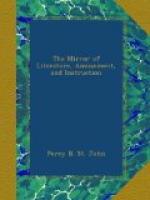Halsted, in his History of Kent, tells us, “The pay of the burgesses of Canterbury was fixed (anno 1411) at two shillings a-day for each, while such burgess was absent from his family attending his duty. In 1445 the wages were no more than twelve pence a-day; two years afterwards they were increased to sixteenpence, and in 1503 had again been raised to two shillings. In Queen Mary’s reign, the corporation refused to continue this payment any longer, and the wages of the members were then levied by assessment on the inhabitants at large, and continued to be so raised till these kinds of payments were altogether discontinued.”
P.T.W.
* * * * *
THE WORD “EI.”
(For the Mirror.)
This word, which was engraven on the temple of Apollo, at Delphi, has occasioned much controversy among the literati. The learned and admirable Plutarch tells us that it means “thou art” as if “thou art one.” The Langhornes, in their life of this philosopher, [2] attack his opinion as inconsistent with “the whole tenour of the Heathen Mythology.” It in to be observed, that the Greek word for priests is “[Greek: iereis]” (iereis). But I infer nothing from this; yet at the same time it is a remarkable circumstance. The objection of the Langhornes is frivolous; for the sun (Apollo) in most nations, was considered chief of the gods, and this inscription was placed to prove his superiority and unity.
[2] Langhorne’s Plutarch, vol. i. p. xv.—Limbird’s edition.
It is a very remarkable circumstance, that when the Pythia refused to enter the temple, at the application of Alexander, “Philip’s godlike son,” and he attempting to force her in, she exclaimed—“[Greek: Anikaetos ei o pai]” (My son, you are invincible.) Now, probably, she had some other intention in using that word; but, however, that does not affect the argument. I cannot but consider that Plutarch is right.
B.K.
* * * * *
A FAREWELL TO SPAIN.
FOR MUSIC.
(For the Mirror.)
Land of the myrtle and the vine,
The sunny citron-tree,
With heart upon the waves I give
My latest look to thee.
Thy glorious scenes of vale and hill
With joy I now resign,
And seek a more congenial land,
Where Freedom will be mine.
Farewell! thou hast the iron sway
Of bigots and of slaves,
But mine shall be a chainless heart
Upon the dark blue waves.
For thee our sires have fought and died,
For thee their blood have
given,
When tyrants o’er the trampled field
Like thunder-clouds were driven.
And has the purple tide in vain,
From hill and vale been poured,
Or do the hopes of Freedom sleep
With mighty Mina’s sword?




